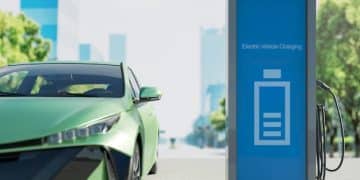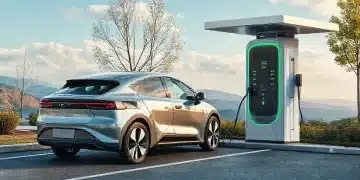Government incentives for electric car buyers explained

Government incentives for electric car buyers include tax credits, rebates, grants, and subsidies for charging stations, significantly reducing ownership costs and promoting sustainable transportation.
Government incentives for electric car buyers are gaining attention as a way to encourage eco-friendly transportation. Have you considered how these incentives can ease your financial burdens while contributing to a cleaner planet? Let’s explore what they entail.
Understanding government incentives
Understanding government incentives is crucial for anyone considering an electric vehicle (EV). These programs aim to encourage more people to choose eco-friendly transportation. By offering various financial perks, they make it easier for consumers to invest in electric cars.
Types of Government Incentives
There are several types of incentives that buyers can benefit from. Knowing these can help you maximize your savings.
- Tax Credits: These lower the amount of tax you owe, making EVs more affordable.
- Rebates: Some states offer cash back after purchasing an electric vehicle.
- Grants: These programs can assist with the costs of purchasing a new EV, particularly for low-income households.
- Charging Station Subsidies: Financial assistance for installing home charging stations is often available.
Each of these incentives plays a role in making electric vehicles appealing. For instance, a substantial tax credit can significantly reduce the initial purchase price. This makes owning an EV more probable for families and individuals alike.
How to Find Available Incentives
Finding the right incentives for your situation is essential. Most states have specific programs, and the federal government also provides benefits. You can start your search by visiting government websites that list available rewards.
Additionally, local dealerships often have up-to-date information on what programs apply to their cars. Engaging with EV-focused groups online can also yield helpful insights, as other buyers share their experiences.
Understanding government incentives can substantially affect the decisions you make regarding an electric vehicle. By knowing what assistance is out there, you can take advantage of these offerings and support a greener future.
Types of incentives available
There are many types of incentives available for electric car buyers. Understanding these can help you save money and make informed choices when purchasing your vehicle. Each type of incentive serves a unique purpose, aimed at making electric car ownership more appealing and accessible to everyone.
Tax Credits
Tax credits are one of the most popular incentives. They reduce the amount of income tax you need to pay, lowering the overall cost of your electric vehicle. In several regions, these credits for electric cars can range from a few thousand dollars to substantial amounts. Finding out what applies in your area is essential.
Rebates
Another option is rebates. These are often offered at the point of sale or shortly after your purchase. Some states provide direct cash back for electric vehicle purchases, making them an excellent incentive for buyers, even if they may not be as large as tax credits.
- Cash refunds upon purchase
- Some state programs can include county-based rebates
- Electric utility companies sometimes offer additional rebates for EV buyers
Grants
Grants are less common but can be extremely beneficial. These financial awards are often given based on specific criteria, such as income level or geographic location. Grants may cover part of the cost of purchasing an electric vehicle, especially for low-income applicants or non-profit organizations.
Charging Infrastructure Incentives
Incentives also exist for charging infrastructure. Many governments provide subsidies for the installation of home charging stations. This makes owning an electric vehicle more convenient and less costly.
- Partial coverage for home charging station installations
- Grants to municipalities for public charging stations
- Tax deductions for businesses installing charging stations
By leveraging these various types of incentives, potential electric car owners can significantly reduce their overall costs. Whether it’s through tax credits, rebates, grants, or assistance with charging stations, understanding these options empowers consumers to make greener choices.
How to qualify for tax rebates

Qualifying for tax rebates can significantly benefit electric car buyers. Understanding the criteria allows you to maximize your savings effectively. Each program may have different requirements, but there are common factors to consider.
Eligibility Criteria
Your first step is to determine if you qualify based on the eligibility criteria. Generally, you need to purchase a qualified electric vehicle that meets specific standards. These standards are set by the federal government or state agencies.
- Make sure the vehicle is categorized as an electric vehicle.
- Verify if the manufacturer limit has not been reached; some tax credits are only available until a certain number of cars are sold.
- Check if there are additional local requirements to qualify for rebates.
Documentation Required
Gathering the necessary documentation is a crucial part of the process. You will need to provide proof of purchase for your vehicle. This typically includes a receipt and the vehicle identification number (VIN).
Some states may require additional paperwork, such as proof of residency or income statements to ensure you meet local qualifications.
Filing Taxes
When it comes to filing your taxes, you’ll need to complete the appropriate forms. The IRS Form 8834 is commonly used for electric vehicle tax credits. This form allows you to claim your credit and ensures you receive the correct amount back.
Keep in mind that elusive details can sometimes change, so it’s wise to consult with a tax professional if you’re unsure about the process. They can provide guidance tailored to your situation.
Having a good understanding of how to qualify for tax rebates is crucial for anyone considering an electric vehicle. By following the necessary steps and ensuring you have all required documentation, you can take full advantage of these financial benefits.
Long-term savings with electric vehicles
When considering an electric vehicle (EV), understanding the long-term savings is essential. Many people focus on the initial purchase price, but the real financial benefits often come over time. By analyzing various factors, you can see how choosing an EV can lead to significant savings.
Lower Fuel Costs
One of the biggest advantages of electric vehicles is their lower fuel costs. Charging an EV typically costs much less than fueling a traditional gasoline car. This can lead to substantial savings, especially for people who drive frequently.
- Electric rates are generally lower than gas prices.
- Home charging can be more convenient and cost-effective.
- Potential savings increase with renewable energy sources.
Reduced Maintenance Expenses
Electric vehicles have fewer moving parts compared to their gasoline counterparts. This means that they often encounter reduced maintenance expenses. Without the need for oil changes or many complicated engine repairs, EV owners can save both time and money.
Additionally, many EV manufacturers provide excellent warranties, which can cover repairs and maintenance during the initial years of ownership.
Incentives and Rebates
When calculating long-term savings, don’t forget to factor in government incentives and rebates. These financial benefits can significantly lower the initial cost of the vehicle and may even include benefits for home charging installations.
By combining tax credits with savings on fuel and maintenance, the overall cost of ownership becomes very competitive against traditional vehicles.
Choosing an electric vehicle clearly showcases a pathway to long-term savings. The combination of lower fuel costs, reduced maintenance expenses, and financial incentives paint a compelling picture for potential EV buyers, allowing them to envision a brighter, more cost-effective future.
Environmental impact of government policies
The environmental impact of government policies regarding electric vehicles is significant. These policies do not just influence car manufacturing; they also shape how society interacts with sustainable practices. When governments advocate for electric vehicles, they help reduce carbon emissions and promote cleaner air.
Reduction in Greenhouse Gas Emissions
One major benefit of encouraging electric vehicle adoption is the reduction in greenhouse gas emissions. Gasoline and diesel vehicles produce substantial amounts of CO2, contributing to climate change. By shifting to electric vehicles, we lower these emissions considerably.
- EVs generate zero tailpipe emissions, greatly improving urban air quality.
- The transition to renewable energy sources for charging further reduces overall emissions.
- Government incentives promote the rapid deployment of charging infrastructure, enhancing accessibility.
Support for Sustainable Energy
Government policies aimed at electric vehicles often align with the broader goal of promoting sustainable energy. By encouraging wind, solar, and other renewable energy sources to charge electric vehicles, these policies help create a more sustainable energy infrastructure.
Governments may also provide funding for research and development in clean energy, paving the way for new technologies while moving away from fossil fuels.
Encouraging Behavioral Changes
Policies that support electric vehicles encourage behavioral changes in individuals and businesses. When incentives are available, consumers are more likely to choose electric cars, which promotes an eco-friendly mindset.
This change can lead to increased awareness of environmental issues, prompting more people to consider their lifestyle choices and their impact on the planet. As a result, government policies can catalyze a broader shift toward sustainability.
Overall, the environmental impact of government policies is profound. They create avenues for reducing emissions, supporting clean energy, and encouraging more sustainable behaviors in society, ultimately benefiting our planet.
FAQ – Frequently Asked Questions about Government Incentives for Electric Car Buyers
What are the main types of government incentives for electric car buyers?
The main types include tax credits, rebates, grants, and incentives for charging infrastructure.
How can I qualify for tax rebates?
To qualify, you must purchase a qualified electric vehicle, meet specific eligibility criteria, and provide the necessary documentation when filing taxes.
What long-term savings can I expect from owning an electric vehicle?
Owners can expect lower fuel costs, reduced maintenance expenses, and the benefits of government incentives that contribute to significant overall savings.
What is the environmental impact of government policies on electric vehicles?
These policies help reduce greenhouse gas emissions, promote sustainable energy, and encourage environmentally friendly behaviors in society.





